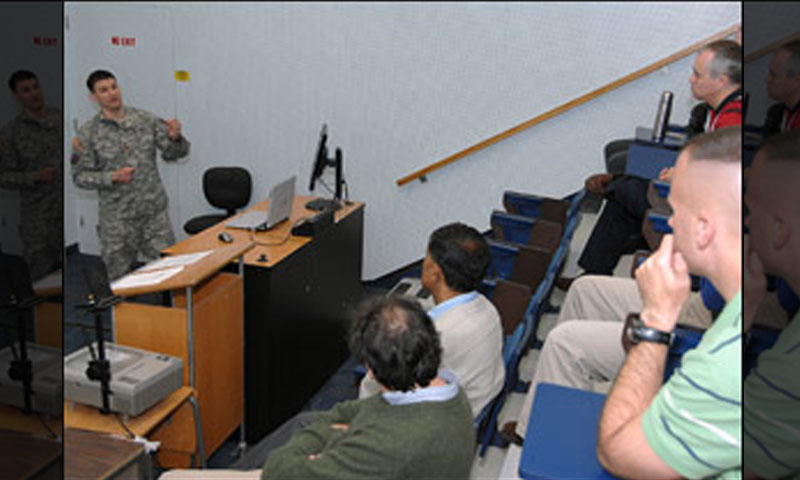Doctoral students from the Naval Postgraduate School’s (NPS) Department of Electrical and Computer Engineering (ECE) enhance their research studies by taking Introduction to Doctoral Research (EC 4000), a seminar course that promotes excellence in research while cultivating interaction between students and faculty.
The primary objective of EC 4000 is to prepare ECE doctoral students for the initial steps of their research by providing guidance on screening and qualifying exams, research processes and requirements. The course also provides students an overview of the current ECE research issues related to national defense needs, and gives students an opportunity to formally meet on a weekly basis to share and discuss research ideas.
One of the main features of EC 4000 is its guest speaker series, which invites distinguished researchers, professors and other Ph.D. students to share their research and expertise.
According to Prof. Murali Tummala, the EC 4000 faculty coordinator and ECE Ph.D. Committee Chairman, speakers are typically drawn from among several categories: professors from other universities; experts from industries in Silicon Valley; IEEE distinguished lecturers; ECE and NPS faculty; and ECE doctoral students in the advanced stages of their research.
Last quarter, ECE Prof. Todd Weatherford delivered a lecture to EC 4000 students, “A Historical Perspective on Naval Science and Technology: NPS Past & Future,” which discussed the technological advances made during times of conflict and the resulting ties created between civilian and military researchers.
Weatherford believes NPS represents the last link within the Navy that directly connects military officers and civilian scientists. He encouraged doctoral students – both civilian and military – to take advantage of their time at NPS by learning from each other and interacting as much as possible.
During another recent guest lecture, Lt. Cmdr. John Stevens, an NPS alumnus who received his master’s and doctorate degrees in electrical engineering, discussed the work he conducted while on an individual augmentee assignment with the Joint CREW Composite Squadron One (JCCS-1) in Iraq.
As a systems engineer for JCCS-1, Stevens provided support for electronic warfare and helped counter radio controlled improvised explosive devices.

Lt. Cmdr. John Stevens, an NPS alumnus who received his master’s and doctorate degrees in electrical engineering, discusses how studies here benefit the work he conducted while on assignment in Iraq, especially in articulating capabilities and limitations to operators in the battlefield, and making better, more well-informed decisions.
He told students the courses he took at NPS helped him in his assignment by enabling him to articulate the capabilities and limitations of his work to operators in the battlefield, while making better informed decisions. Stevens also said being in the Navy and at NPS helped him develop a “plain and simple sense of urgency,” which prepared him for the intense work environment in Iraq.
Air Force Capt. James Caldwell, an ECE Ph.D. student enrolled in EC 4000, said students benefit from the course because it enables them to share ideas and seek guidance. In addition, he said the guest speakers help “bring in outside research work that ensures we know the latest technical news in industry and academia.”
Tummala said guest speakers who have different academic backgrounds from the students are of particular value to the program, because they help students gain a better understanding of other research areas. “Our students are always looking for new ideas, so when we bring in guest speakers, especially from outside NPS, it really helps expand their horizons,” he said.
A similar course, Introduction to Graduate Research (EC 3000), is required of all students in the ECE Department’s ABET accredited Master of Science, Electrical Engineering (MSEE) Degree Program. EC 3000 students also benefit from the EC 4000 guest speakers as the students in these two courses often meet together for seminars, said Cmdr. Dave Neely, an ECE military professor who co-teaches the course with Prof. Jeff Knorr, the ECE Department Chair. According to Knorr, the EC 3000 course includes online lessons, faculty presentations, graduating student thesis presentations and seminars. The online lessons and several classroom meetings cover the thesis process, library resources, MathType, critical thinking, ethics, research misconduct and oral presentations.
For more information about the ECE program visit http://www.nps.edu/ece.

